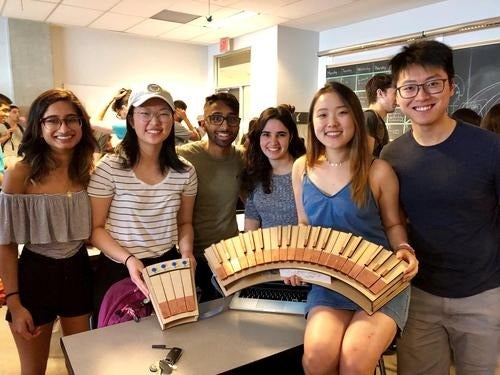Editor:
Brandon Sweet
University Communications
bulletin@uwaterloo.ca
Students hit the right notes with accessible instruments

Members of the Astratta team from left: Tanya Ralliaram, Annie Zhang, Neil Agarwal, Rachelyn Collins, Charmaine Wang and Eason Gao.
This is an excerpt of a story originally published on the Faculty of Engineering news site.
A class of systems design engineering students has proven that just about anyone can play a musical instrument, even individuals with complete hearing loss. Students in Matt Borland’s SYDE 361 course gave an end-of-term concert demonstrating what they designed over the past three months for people with various disabilities.
By combining hands-on engineering skills and creativity, 16 teams came up with everything from a wearable tech vest that allows people with hearing loss to enjoy music through both sight and vibrations, to a synthesizer for the blind and an accessible xylophone for people with stage 2 rheumatoid arthritis.
Team Toto built an instrument for people with Duchenne muscular dystrophy that is caused by a genetic defect and leads to muscle weakness and loss of muscle mass. The students produced a keyboard that requires less force to play in a much smaller range of motion. The keys are backed with Velcro so they can be easily repositioned in a way that is ergonomically best for the individual.
A modified piano for stroke survivors was created by team Astratta.“When people suffer strokes usually half their body ends up with less dexterity,” said member Rachelyn Collins. “So we created a piano on which they can play with one hand while playing pre-recorded chords that before a stroke could have been played with the other.”
Borland, a systems design engineering lecturer, said working closely with individuals with various accessibility issues was meaningful for his students.
“We were very lucky to have the support of the Waterloo Experiential Learning Institute that provided us with funding so we could pay for participants to come in,” said Borland. “It was great exposure for our students and provided a lot of growth for them both as designers and as people.
Offloading information could expose our memories to manipulation

This is an excerpt of an article originally published on the Faculty of Arts news site.
When people use their computer or smartphone to store information, they may not be able to detect if that information has been manipulated when they retrieve it later, according to researchers from the University of Waterloo.
“In our study, individuals could rely on an external store when trying to remember some material and manipulations of that store often went undetected,” said Evan Risko, lead author of the study and a professor of psychology.
For the study, participants performed a series of memory tasks where they were required to use a file on a computer to store and later recall a list of words that the researchers presented to them. This computer file functioned as the participant’s external memory store similar to how people might store information they want to remember on a smartphone. For the first three trials, the list the participants stored on the computer was untouched. This allowed participants to develop trust in their external memory store.
On the last trial, researchers secretly inserted a new word into the computer file before the information was retrieved. They then used a variety of measures to determine whether participants noticed the added word or not.
The results showed that people rarely noticed the manipulation of the computer file. In fact, they were often highly confident that items inserted into their external memory had been part of their original list.
Link of the day
When and Where
On-campus examination period, Friday, August 2 to Friday, August 16.
New Faculty Teaching Days, Wednesday, August 7 to Friday, August 9.
Lobsterlicious at the University Club, Wednesday, August 7 to Friday, August 16, 11:30 a.m. to 2:00 p.m., University Club.
Quantum Cryptography School for Young Students, Friday, August 9 to Friday, August 16.
Renison Night Market, Friday, August 9, 6:00 p.m. to 10:00 p.m., Renison Upper Parking Lot.
Online examinations, Saturday, August 10.
Ontario Mennonite Music Camp, Sunday, August 11 to Friday, August 23, Conrad Grebel University College.
UW Food Services Recruitment Fair, Monday, August 12, 3:00 p.m. to 6:00 p.m., Federation Hall.
Perseids Sky-watching Party and Cosmic Mirages Lecture, Monday, August 12, 7:30 p.m., OPT 347.
Department seminar by Dr. Pavel Krupskiy, University of Melbourne, "Spatial Cauchy processes with local tail dependence," Tuesday, August 13, M3 3127.
Eating Disorder Support Group, Tuesday, August 13, 4:00 p.m., NH 3308.
Instructional Skills Workshop, Tuesday, August 13 to Friday, August 16.
New Faculty Welcome Social, Tuesday, August 13, 2:30 p.m. to 4:00 p.m., The Grad House (second floor).
NEW - Workday Drop-in Support, Tuesday, August 13, 9:00 a.m. - 11:30 a.m. and 1:30 p.m. - 4:00 p.m., EC1 1021.
Webinar: Authors' Rights, Wednesday, August 14, 10:00 a.m.
In-person Part-time MBET Information, Wednesday, August 14, 6:00 p.m. to 7:30 p.m., E7 second floor.
Grades begin to appear in Quest, Saturday, August 17.
Quantum Key Distribution Summer School, Monday, August 19 to Friday, August 23.
More Feet on the Ground - Mental Health Training for Faculty and Staff, Monday, August 19, 9:30 a.m., NH 2447.
Deadline to get “Fees Arranged,” Tuesday, August 20.
NEW - Workday Drop-in Support, Tuesday, August 20, 9:00 a.m. - 11:30 a.m. and 1:30 p.m. - 4:00 p.m., EC1 1021.
Pension Lunch and Learn session, Thursday, August 22, 12:00 p.m to 1:00 p.m., STC 1012.
Co-operative work term ends, Friday, August 23.
NEW - Workday Drop-in Support, Tuesday, August 27, 9:00 a.m. - 11:30 a.m. and 1:30 p.m. - 4:00 p.m., EC1 1021.
Getting Started in LEARN, Wednesday, August 28.
Copyright for Teaching, Wednesday, August 28, 10:00 a.m. to 11:00 a.m., LIB 329.
Waterloo Women's Wednesdays: How to Set and Crush Your Goals, Wednesday, August 28, 12:00 p.m., MC 5479.
International Orientation, Thursday, August 29 to Saturday, August 31.
QPR Mental Health Training for Faculty and Staff, Thursday, August 29, 9:30 a.m. to 11:00 a.m., NH 2447.
Residence Move-In Day, Saturday, August 31.
PhD oral defences
Systems Design Engineering. Xinran Liu, “Real-Time 3D Surface-Shape Measurement Using Fringe Projection and System-Geometry Constraints.” Supervisor, Jonathan Kofman. On display in the Engineering graduate office, E7 7402. Oral defence Thursday, August 8, 1:00 p.m., E5 6111.
Electrical & Computer Engineering. Li Zhu, “High-Q Multi-Band Filter.” Supervisors, Raafat Mansour and Ming Yu. On display in the Engineering graduate office, E7 7402. Oral defence Thursday August 8, 2:00 p.m., EIT 3142.
Chemistry. Tijana Vasilijevic, “Developments and applications of solid phase microextraction (SPME) coupled to direct analysis in real time (DART) and approaches towards small volume analysis.” Supervisor, Janusz Pawliszyn. On deposit in the Science graduate office, PHY 2013. Oral defence Friday August 9, 10:00 a.m., C2 361.
Chemical Engineering. Sungho Park, “Novel Starch Nanocomposites.” Supervisor, Leonardo Simon. On display in the Engineering graduate office, E7 7402. Oral defence Friday August 9, 10:00 a.m., QNC 3402.
Electrical & Computer Engineering. Junwen Jiang, "MIT/PCM-Based RF Switches for Tunable Filter Application." Supervisor, Raafat Mansour. On deposit in the Engineering graduate office, E7 7402. Oral defence Friday, August 9, 2:00 p.m., EIT 3142.
School of Public Health and Health Systems. Chi-Ling Joanna Sinn, "From Less Invisible to More Transparent: Need for and Outcomes of Formal Personal Support Services in Long-Stay and Short-Stay Home and Community Care." Supervisor, John Hirdes. On display in the Faculty of Applied Health Sciences, BMH 3110. Oral defence Monday, August 12, 9:00 a.m., AHS 1686.